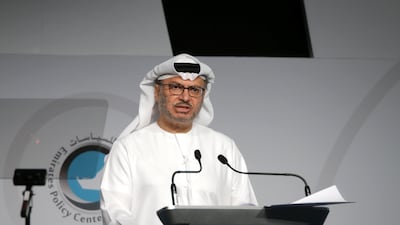The Arab world needs a "strong, developing Saudi Arabia and a stable, robust Egypt" in order to restore stability to the region, a Government minister says.
Dr Anwar Gargash, Minister of State for Foreign Affairs, also spoke of the legacy of the Arab Spring uprisings in 2011 and conflict in Syria, Yemen and other states in a speech at the Abu Dhabi Strategic Debate on Sunday.
"It is only by adopting a strategy focused primarily on achieving stability that we will be able to alter the current trajectory," he said.
"In the UAE’s view, the success of this strategy depends on there being a strong, developing Saudi Arabia and a stable, robust Egypt.
"But it will also ultimately depend on the success of modernising agendas across the region, for the UAE does not argue for a return to the past."
Dr Gargash said there was a myth that the UAE sought a return to a time before the Arab uprisings six years ago, in which rulers in Tunisia, Egypt, Libya and Yemen were ousted and civil unrest and protests broke out in many other countries.
____________
Read more:
US 'monitoring closely' crisis in Lebanon ahead of meetings with Saudi minister
With Hariri gone, Lebanon is on a dangerous path
Saudi detains and questions 208 over embezzled $100 billion
____________
"This is profoundly mistaken," he said.
"The UAE was right to fear the consequences of revolution - it has proved easier to destroy institutions than to build new ones and revolutions have created vacuums that extremists have exploited and that have allowed certain regional players to exercise an outside role in our world.
"But the UAE has always been a passionate advocate of evolutionary change in our region."
Dr Gargash said unrest in the region has had "terrible humanitarian consequences" in recent years. Last year, the United Nations estimated that the uprisings between 2011 and 2015 cost the region more than $600 billion in lost economic activity.
Since 2015, the UAE has provided more than $2.4 billion in humanitarian and development assistance to the people of Yemen.
"The pendulum tends to swing between aspirations for stability and development and the realities of chaos and violence," he said.
"Too many people are suffering the terrible humanitarian consequences of the recent years of turmoil.
"We keep trying to manage these complicated issues but so far, we found the solutions to them illusive."
He called on the need to focus collective energies on deepening and widening the consensus around a moderate regional agenda. “There have been some small but strategically important steps towards greater stability in the region,” he said.
“But Iran’s efforts to provide active support for proxies in other countries, install sectarian tensions and undermine the integrity of nation states have got worse. In recent days, we have seen Iranian-made ballistic missiles fired by Iran’s proxy Houthi militia towards Riyadh. This is a serious escalation and one that undermines Iranian claims about the passive nature of its own missile programme.”
He said the UAE would not remain idle under the shadow of such a threat.
“There is now a real opportunity for Arab countries to work hand in hand with the international community to consistently push back against Iranian interference,” Dr Gargash said.
“It is deeply regrettable that this is the lens through which we are compelled to deal with Iran but given its current behaviour, we are simply not yet in a position to be able to speak about the escalation or dialogue.”
On Saudi, he spoke of the emergence of a country equipped to deal with the challenges of the future.
“These developments in a key regional power like Saudi Arabia send a powerful message of hope,” he added.
“Everyone who cares about a moderate, stable future for the region should lend their support to the Saudi reform agenda. The region’s moderate Islamic block is getting stronger and the extremists weaker but we need to remain vigilant – this is a battle over the heart and soul of our region and it is one we cannot afford to lose.”
The combination of weakening extremist factions and an enhanced resistance to Iranian interference was said to help open the door to political solutions to the region’s conflicts.
“The Arab region is still suffering from the fallout of so-called Arab Spring uprisings which started in 2011,” said Dr Ebtisam Al Ketbi, president of the Emirates Policy Centre, an Abu Dhabi-based think tank which organised the event. “It still lives in a state of fires and flames with wars raging in Yemen, Syria and Libya. Iran continues its policies undermining Arab states by supporting armed militias and fermenting sectarian discourse.”
She said countries such as Iran and Qatar have played detrimental roles by insisting on making the region return to backwardness as they pursue policies that feed into conflict.
“Iran and its proxies do not offer people in the region anything but chaos, sectarian wars and the collapse of nation-states,” she added.
“Saudi’s social and economic reform efforts gain to significantly contribute to shaping a better future for the region and ensure the well-being of its people.”

